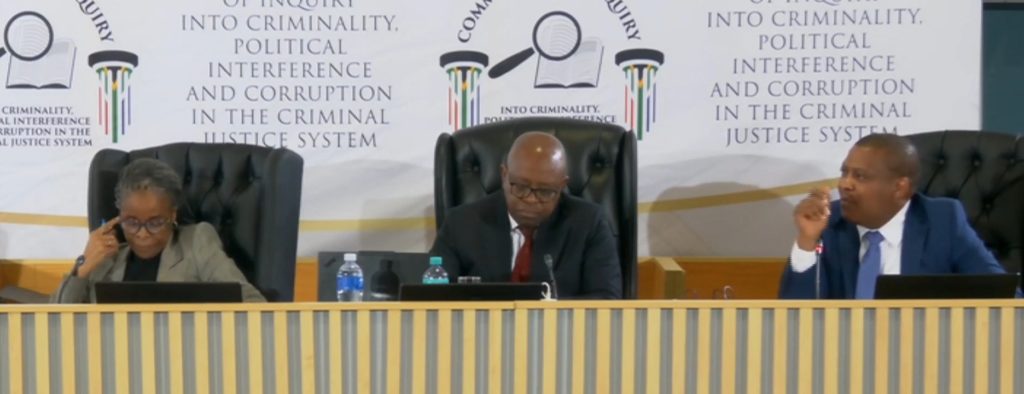By Skhumbuzo Mdunge
The evidence submitted in the Madlanga Commission thus far has shown that the South African Judiciary system is in tatters. The police crime statistics for the final quarter of 2024 revealed that an average of 34 people are shot dead every day in South Africa from the period 01 October 2024 to 31 December 2024. This spine-chilling evidence emerged from the submissions of the national head of ballistic forensics in the police, Brigadier Mishak Mkhabela, in the ongoing Madlanga Commission. Now, one cannot help but ask: Is our justice system able to deal with these murder cases involving firearms?
President Cyril Ramaphosa initiated the Madlanga Commission to investigate allegations of criminality, political interference, and infiltration of drug cartels into South Africa’s Criminal Justice System. This move was taken shortly after KwaZulu-Natal (KZN) Police Commissioner, Lieutenant-General Nhlanhla Mkhwanazi, opened a can of worms at a press briefing in July this year. Mkhwanazi made damning allegations against high-profile public officials, particularly police minister Senzo Mchunu, saying they are affiliated with the drug cartels. As part of his accusations, Mkhwanazi claimed Mchunu had ordered the immediate disbandment of the Political Killings Task Team unit (PKTT) in KZN on the 31st of December 2024.
Recently, Mkhabela testified about systemic failures within his department. His testimony revealed critical staff deficits, a myriad of case backlogs, and errors in forensic reports linked to multiple murders. Mkhabela noted staff deficits as a major contributor that delays gun-related murder cases from being resolved. Indeed, one may agree that ‘justice delayed is justice denied.’
“On any given day, I have 42 analysts who deal with 29,000 firearms nationwide, and 41,000 ballistic cases each linked to a killing somewhere. We don’t have a space anymore, like I said, we receive more than what we can process,” Mkhabela told the commission.
What Mkhabela presented shows that the SAPS do not have sufficient skilled police to deal with gun-related murder cases that need ballistics evidence before they can proceed to the criminal court. If Mkhwanazi had not broken the silence, South Africans would not have heard these shortcomings or cracks within the justice system.
Police Recruitment
The issue of police recruitment needs to be re-examined, not only as a box-ticking exercise to fill in the vacant positions, but also as a strategic process to ensure that the department is able to attract and retain people with the right skills, fitness, integrity, and commitment to serve the public.
Missing Dockets
The Madlanga Commission has also taught us that the reliance of political parties on private funding to sustain their election campaigns has created fertile ground for corruption and undue influence on the police department. One area that urgently requires reform is the handling of crime dockets. The process should be fully audited and automated. It is unacceptable that in 2025, we still hear of missing hardcopy dockets.
Currently, when a victim reports a case, they must visit a police station, write an affidavit, and rely on an officer to register it on the Crime Administration System (CAS). Beyond that point, the victim has no digital means, such as a website or mobile application, to track the progress of their case. Their only option is to call the police station or the detective assigned to their case using the case number provided. This manual exercise within the system creates fertile grounds for corruption. Once the police official or detective handling the case gets a bribe, it becomes easy to claim that the docket has gone “missing”.
In the controversial Mkhwanazi media conference, he reported that a total of 121 dockets linked to political killings were removed from the PKTT to Gauteng on the instruction of Police Minister, Senzo Mchunu, who subsequently disbanded the PKTT unit without informing the national police commissioner or KZN police commissioner, before the dockets went missing.
Alleged Judicial Misconduct
Apart from SAPS’s shortcomings, it is very important for the public to trust the judicial system when a case gets into court. In the Madlanga Commission, two police detectives, “Witnesses A” and “Witness B,” whose identities were not disclosed because of safety reasons, accused Judge Aubrey Ledwaba of receiving a bribe of R2.5 million to grant the bail application of notorious businessman and murder accused, Katlego “KT” Molefe. “Witness A” said he got a tip-off a day before about the premeditated bail outcome. Chief Justice Mandisa Maya said even though Judge Ledwaba has not been found guilty of any misconduct, such allegations are damaging Ledwaba;s reputation and the integrity of the judicial system. Maya called on people with evidence to file official complaints with the Judicial Conduct Committee (JCC).
In another case, judges Selby Mbenenge, who is accused of sexual misconduct. If these two judges preside over a case of sexual misconduct or corruption, whatever findings they get will always be linked to their reputation as judges. Hence, in order to repair cracks within the judicial system, police recruitment, system automation, and attaining trust in the judicial system are some of the key points that should be prioritised after the Madlanga Commission.


